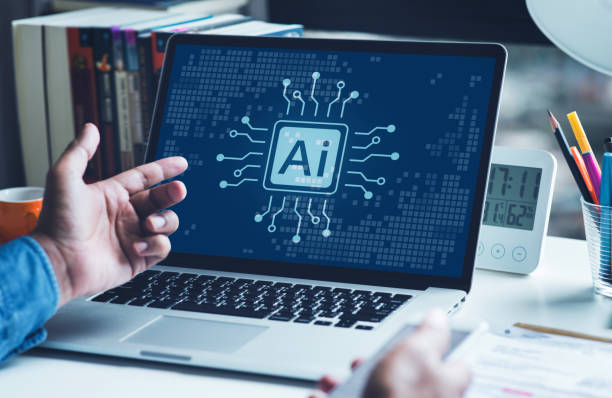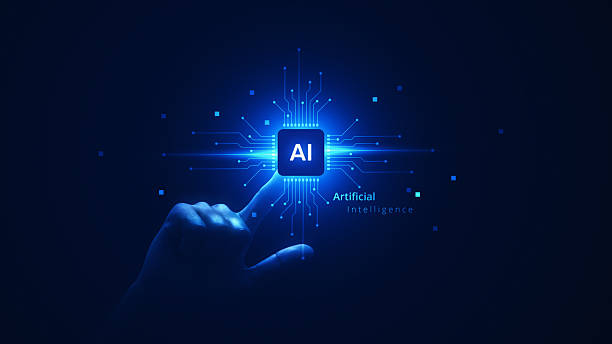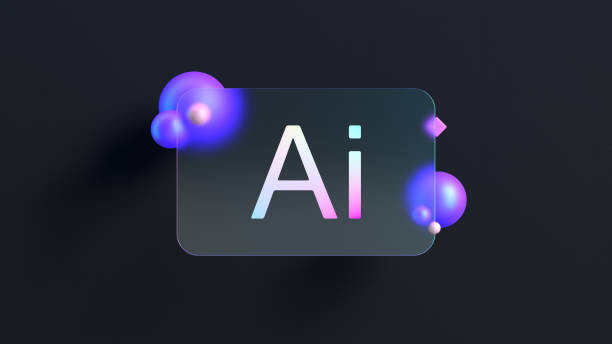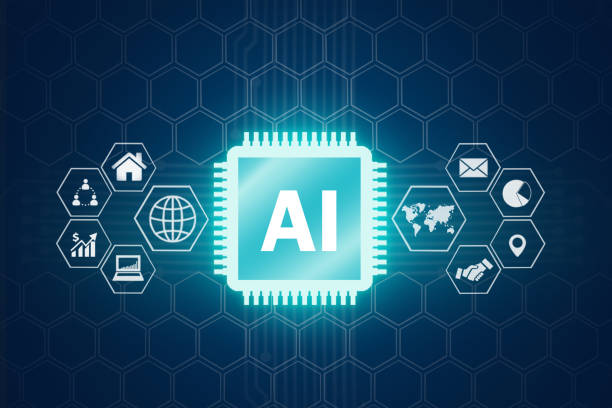AI in Your Pocket: A Review of Mobile AI Applications
The world of mobile applications is rapidly evolving, and #ArtificialIntelligence is playing an increasing role in this transformation.
From voice assistants to photo and video editing tools, mobile AI applications offer new capabilities to users.
These applications, using complex algorithms, are able to learn, adapt, and provide personalized services.
Meanwhile, choosing the right mobile AI application, given the variety and breadth available, can be challenging.
Our goal in this article is to provide a comprehensive guide to help you with this choice.
Today, mobile AI applications are no longer just a fun tool, but have become a necessity for many people.
These applications can help us in various fields, including time management, improved productivity, facilitating communication, and even healthcare.
For example, language learning applications using AI can provide personalized lessons and accurately track your progress.
Or, health applications, by analyzing data collected through mobile phone sensors, can provide health recommendations and help with early disease detection.
AI on mobile provides a wide range of features to the user.
However, using mobile AI applications also has its own challenges.
Concerns about privacy, data security, and algorithmic biases are among the most important of these challenges.
Therefore, it is essential to research any application thoroughly before installing and using it, and to ensure its privacy and security policies.
Is your company’s website as professional and reliable as it should be? Create an online presence that reflects your credibility and attracts more customers with professional company website design by Rasaweb.
✅ Build a powerful and professional image of your brand
✅ Turn visitors into real customers
⚡ Get a free consultation now!
Types of Mobile AI Applications and Their Uses
Mobile AI applications fall into various categories, each with its own specific uses.
Some of the most common categories include voice assistants, photo and video editing applications, language translation applications, health and wellness applications, educational applications, and game applications.
Voice assistants such as Siri (Siri) and Google Assistant (Google Assistant) allow users to control their device with voice commands, search for the information they need, and perform various tasks.
Photo and video editing applications using AI can automatically enhance images, remove unwanted objects, and add special effects.
Language translation applications using #NeuralNetworks can translate texts and speech into different languages.
These applications are especially useful for travelers and people who deal with foreign languages.
Health and wellness applications, by analyzing data collected through mobile phone sensors, can provide health recommendations and help users manage their weight, sleep, and level of physical activity.
Educational applications using AI can provide personalized lessons and accurately track user progress.
Game applications also use AI to provide a more interactive and challenging experience for players.
Mobile AI applications can help us in many tasks.
In general, mobile AI applications have very wide applications and can be useful in various areas of our lives.
However, it is important to research any application thoroughly before using it, and to ensure its privacy and security policies.
Criteria for Choosing the Right Mobile AI Application
Choosing the right mobile AI application requires considering various factors.
Here are some of the most important criteria: Your needs: First of all, you need to specify what type of application you are looking for and what expectations you have of it.
Are you looking for a voice assistant? Or a photo editing application? Or an educational application? Accurately determining your needs will help you narrow down your options and make a better choice.
Developer credibility: Before installing any application, be sure to pay attention to the credibility of its developer.
Applications developed by reputable and well-known companies are usually of higher quality and more secure.
User reviews: Reading reviews from other users can provide you with useful information about the application’s performance, capabilities, and potential problems.
Pay attention to both positive and negative reviews and try to get an overall view of the application.
Privacy policies: Before installing any application, be sure to read its privacy policies and make sure your personal information is properly protected.
Application access permissions: Pay attention to the permissions that the application requests to access your device’s information and capabilities.
If an application requests unnecessary permissions, avoid installing it.
Price: Some mobile AI applications are free, while others require payment.
Check the price of any application before installing it and make sure it fits your budget.
Mobile AI applications are very diverse.
Speed and efficiency:
| Feature | Application A | Application B |
|---|---|---|
| Accuracy | High | Average |
| Processing Speed | Fast | Slow |
| Security | High | Average |
Make sure the application you want has good speed and efficiency and does not slow down your device’s performance.
Click here to preview your posts with PRO themes ››
Privacy and Security in Mobile AI Applications
As mentioned earlier, privacy and security are among the most important concerns about using mobile AI applications.
These applications usually have access to a lot of personal information, including contact information, location, search history, etc.
Therefore, it is essential to research its privacy policies thoroughly before installing any application and be aware of how your personal information is collected, used, and protected.
Some applications may share your personal information with third parties without your knowledge.
Therefore, it is important to look for applications that have transparent and clear privacy policies and allow you to control your personal information.
You should also pay attention to the permissions that the application requests to access your device’s information and capabilities.
If an application requests unnecessary permissions, avoid installing it.
In addition, you should also pay attention to the security of the application.
Insecure applications may be vulnerable to cyber attacks and put your personal information at risk.
Therefore, look for applications that use strong security protocols and are regularly updated.
Mobile AI applications should have high security
To increase your security and protect your privacy when using mobile AI applications, you can take the following steps: Use a strong password for your device.
Enable two-factor authentication.
Update your applications regularly.
Avoid installing unknown and suspicious applications.
Pay attention to the permissions that applications request.
Use a VPN.
Regularly clear your browser’s cache and cookies.
Are you bothered by losing customers due to the outdated appearance or slow speed of your online store? Rasaweb’s team of experts solves these problems with professional and user-friendly online store website design!
✅ Significantly increase customer trust and brand credibility
✅ Amazing speed and excellent user experience
Get a free consultation with Rasaweb now ⚡
The Future of Mobile AI Applications
The future of mobile AI applications looks very bright and promising.
With the increasing advancement of artificial intelligence technology, it is expected that these applications will offer new and more advanced capabilities and play a more prominent role in various areas of our lives.
One of the most important future trends is the increasing use of #DeepLearning in mobile AI applications.
Deep learning allows applications to learn from vast amounts of data and recognize complex patterns.
This will lead to improved accuracy, efficiency, and personalization capabilities of applications.
Another trend is the increasing use of Natural Language Processing (NLP) in mobile AI applications.
NLP allows applications to understand and respond to human language.
This will lead to improved performance of voice assistants, language translation applications, and other applications that deal with human language.
It is also expected that mobile AI applications will find more applications in new fields such as medicine, education, transportation, and agriculture.
For example, medical applications can help with early disease detection, providing personalized treatments, and improving healthcare.
Educational applications can help with providing personalized lessons, monitoring student progress, and improving learning.
Mobile AI applications are improving day by day.
However, it is important to pay attention to the challenges related to privacy, security, and algorithmic biases and provide solutions to deal with them.
To fully benefit from the potential of mobile AI applications, it is necessary to adopt a responsible and ethical approach in the development and use of this technology.
Case Study of Several Popular Mobile AI Applications
To better understand the applications of mobile AI applications, in this section we will examine several popular applications.
Google Assistant is a smart voice assistant that allows users to control their device with voice commands, search for the information they need, and perform various tasks.
Google Assistant uses natural language processing to understand human language and can answer your questions, set appointments, play music, and so on.
Photoshop Camera is a photo editing application that, using artificial intelligence, can automatically enhance images, add special effects, and create attractive portraits.
This application has a collection of smart lenses that allow you to edit your images in creative ways.
Duolingo is a language learning application that, using artificial intelligence, provides personalized lessons and accurately tracks your progress.
Duolingo uses a gamified approach to language learning and helps you learn a new language effectively and enjoyably.
Headspace is a meditation and mindfulness application that, using artificial intelligence, provides personalized meditation exercises and helps you reduce your stress, improve your sleep, and increase your focus.
This application has a collection of guided meditation exercises that you can do anytime, anywhere.
Mobile AI applications are becoming more widely used over time.
These are just a few examples of popular mobile AI applications.
Given the increasing advancement of artificial intelligence technology, it is expected that we will see the emergence of new and more innovative applications in this field in the future.
Click here to preview your posts with PRO themes ››
Challenges and Limitations of Mobile AI Applications
Despite its many advantages, mobile AI applications also have their own challenges and limitations.
One of the most important challenges is the limited hardware resources of mobile phones.
Artificial intelligence algorithms usually require a lot of processing power and memory.
This can lead to slow application performance, high battery consumption, and increased device temperature.
Another challenge is the issue of privacy and security.
AI applications usually have access to a lot of personal information, including contact information, location, search history, etc.
This can lead to concerns about the misuse of this information and the violation of users’ privacy.
Also, algorithmic biases should be considered.
Artificial intelligence algorithms are trained based on the data they are given.
If this data is biased, the algorithm will also be biased and will provide unfair results.
Mobile AI applications still have shortcomings.
| Operating System | Performance | Compatibility |
|---|---|---|
| Android | Good | High |
| iOS | Average | Average |
To address these challenges and limitations, mobile AI application developers need to pay special attention to privacy and security issues, use diverse and unbiased training data, and continuously improve their algorithms.
Also, users should increase their awareness of the potential dangers of AI applications and avoid installing unknown and suspicious applications.
Key Tips for Mobile AI Application Developers
Mobile AI application developers should pay attention to the following key points: Choosing the right algorithm: Choosing the right AI algorithm depends on the type of application and the hardware limitations of mobile phones.
For applications that require high accuracy, more complex algorithms such as deep neural networks are suitable.
But for applications that require high speed and efficiency, simpler algorithms such as decision trees are more suitable.
Algorithm optimization: AI algorithms usually require a lot of processing power and memory.
Therefore, it is essential that developers optimize their algorithms to run on mobile phones.
This can be done using techniques such as quantization, pruning, and compression.
Collecting training data: AI algorithms need training data to learn and improve their performance.
Therefore, it is essential that developers collect sufficient and diverse training data.
This data should be representative of the target population and prevent potential biases.
Mobile AI applications can advance with the help of developers.
Maintaining privacy and security: Mobile AI application developers should pay special attention to privacy and security issues.
They should avoid collecting unnecessary personal information and use strong security protocols to protect user information.
Testing and evaluation: Before publishing the application, it is essential that developers thoroughly test and evaluate it.
This should be done using a variety of test data and checking the application’s performance under different conditions.
Regular updates: After publishing the application, developers should update it regularly.
These updates should include bug fixes, performance improvements, and adding new features.
Did you know that a poorly designed online store can drive away up to 70% of your potential customers? Resaweb transforms your sales with professional and user-friendly online store website design.
✅ Significant increase in sales and revenue
✅ Full optimization for search engines and mobile
⚡ [Get a free consultation from Resaweb]
How to Optimize the Use of Mobile AI Applications
To optimize the use of mobile AI applications, you can consider the following tips: Awareness of capabilities and limitations: Before using any application, thoroughly research its capabilities and limitations.
This will help you have realistic expectations of the application and use it correctly.
Privacy settings: Check the application’s privacy settings and make sure your personal information is properly protected.
Access permissions: Pay attention to the permissions that the application requests to access your device’s information and capabilities.
If an application requests unnecessary permissions, avoid installing it.
Regular updates: Update your applications regularly.
These updates usually include bug fixes, performance improvements, and adding new features.
Feedback: Provide feedback to application developers.
This feedback helps them improve their application and better meet the needs of users.
Mobile AI applications work better with proper use.
Continuous learning: Artificial intelligence technology is rapidly evolving.
Therefore, to optimize the use of AI applications, it is necessary to continuously learn about this technology and be aware of the latest advances.
Using educational resources: Use various educational resources such as articles, videos, and online courses to learn more about artificial intelligence.
Participate in forums and groups: Participate in online forums and groups related to artificial intelligence and exchange ideas with other users and experts in this field.
Experimentation and experience: Experiment with different AI applications and share your experiences with others.
Click here to preview your posts with PRO themes ››
Summary and Conclusion
Mobile AI applications are powerful tools that can be useful in various areas of our lives.
From voice assistants to photo and video editing applications, these applications offer new capabilities to users and help them do their jobs more effectively and efficiently.
However, using mobile AI applications also has its own challenges.
Concerns about privacy, data security, and algorithmic biases are among the most important of these challenges.
Therefore, it is essential to research any application thoroughly before installing and using it, and to ensure its privacy and security policies.
To optimize the use of mobile AI applications, you should pay attention to the following key points: Identify your needs correctly.
Choose reputable and reliable applications.
Check the application’s privacy settings and make sure your personal information is properly protected.
Pay attention to the permissions that the application requests to access your device’s information and capabilities.
Update your applications regularly.
Use various educational resources to learn more about artificial intelligence.
By following these tips, you can fully benefit from the advantages of mobile AI applications and avoid potential risks.
The future of mobile AI applications looks very bright and promising, and it is expected that we will see the emergence of new and more innovative applications in this field in the future.
Frequently Asked Questions
| No. | Question | Answer |
|---|---|---|
| 1 | What is a mobile AI application? | A mobile AI application is a program that uses artificial intelligence capabilities (such as machine learning, natural language processing, computer vision) to provide smarter and more automated experiences on mobile devices. |
| 2 | Why is artificial intelligence important in mobile applications? | Its importance is due to increased efficiency, personalization of user experience, automation of tasks, improved decision-making, and providing innovative capabilities such as facial recognition or voice assistants. |
| 3 | What are some examples of mobile applications with artificial intelligence? | Voice assistants (such as Siri, Google Assistant), navigation programs with real-time traffic (Google Maps), image filters (Snapchat, Instagram), language translation programs, and facial recognition applications. |
| 4 | What are the challenges in developing mobile AI applications? | Hardware limitations of mobile devices (processing power, battery), the need for large and high-quality data, maintaining user privacy, and the complexity of implementing artificial intelligence models. |
| 5 | What is the role of machine learning in these applications? | Machine learning allows the application to learn from data, identify patterns, and improve its performance over time, such as product recommendation systems or speech recognition. |
| 6 | Do mobile AI applications need an internet connection? | Many advanced artificial intelligence capabilities require an internet connection and cloud processing, but some lighter models can also work “on-device” (without the internet). |
| 7 | How does artificial intelligence help improve the user experience on mobile? | By personalizing content, predicting user needs, automating repetitive tasks, and providing more natural user interfaces such as voice commands. |
| 8 | What is the difference between cloud AI and on-device AI in mobile? | Cloud AI uses powerful servers for processing (requires the internet), while on-device AI performs processing directly on the phone itself (no internet required, but with processing limitations). |
| 9 | What will the future of mobile AI applications be like? | We expect to see increased personalization capabilities, deeper integration with phone sensors, the development of smarter assistants, and advances in on-device processing. |
| 10 | Which frameworks are popular for developing artificial intelligence in mobile? | TensorFlow Lite (for Android and iOS), Core ML (for iOS), PyTorch Mobile are among the popular frameworks for implementing artificial intelligence models in mobile applications. |
And other services of Rasa Web advertising agency in the field of advertising
Intelligent direct marketing: A dedicated service for the growth of campaign management based on intelligent data analysis.
Intelligent UI/UX: A new service to increase click-through rates by optimizing key pages.
Intelligent UI/UX: An effective tool for digital branding by optimizing key pages.
Intelligent Google Ads: Designed for businesses looking to increase click-through rates by optimizing key pages.
Intelligent digital advertising: A combination of creativity and technology for user engagement through marketing automation.
And more than hundreds of other services in the field of internet advertising, advertising consulting and organizational solutions
Internet Advertising | Advertising Strategy | Advertorial
Resources
Review of Google Gemini program
,AI-powered mobile apps
,Best Mobile AI Program
,Artificial intelligence in mobile phone
? Are you ready for your business to shine in the digital world? “Rasaweb Aferin,” a leading digital marketing agency, with comprehensive services including professional WordPress website design, SEO, and content marketing, is your guide to reaching the peaks of online success.
📍 Tehran, Mirdamad Street, next to the Central Bank, South Kazerun Alley, Ramin Alley No. 6














